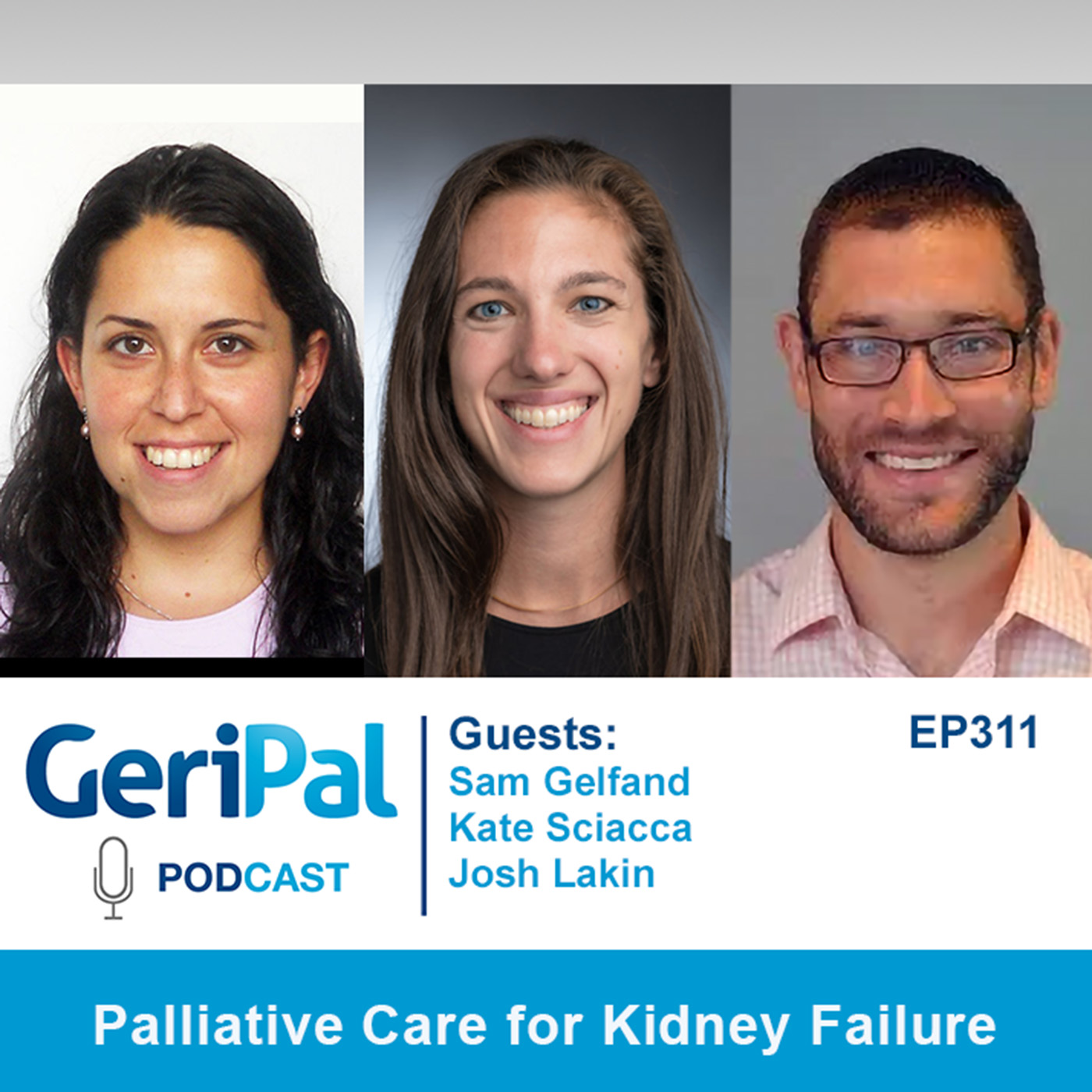
GeriPal - A Geriatrics and Palliative Medicine Podcast
A geriatrics and palliative medicine podcast for every health care professional.
Two UCSF doctors, Eric Widera and Alex Smith, invite the brightest minds in geriatrics, hospice, and palliative care to talk about the topics that you care most about, ranging from recently published research in the field to controversies that keep us up at night. You'll laugh, learn, and maybe sing along.
CME and MOC credit available (AMA PRA Category 1 credits) at www.geripal.org
- Update frequency
- every 7 days
- Average duration
- 42 minutes
- Episodes
- 373
- Years Active
- 2016 - 2025

Cachexia and Anorexia in Serious Illness: A Podcast with Eduardo Bruera
I always find cachexia in serious illness puzzling. I feel like I recognize it when I see it, but I struggle to give a clear definition or provide effective ways to address it.
In today's podcast, we…

Sexual Function in Serious Illness: Areej El-Jawahri, Sharon Bober, and Don Dizon
As Eric notes at the end of today’s podcast, we talk about many difficult issues with our patients. How long they might have to live. Their declining cognitive abilities. What makes their lives mean…

Palliative Care for Kidney Failure: Sam Gelfand, Kate Sciacca, and Josh Lakin
The landscape of options for treating people with kidney failure is shifting. It used to be that the “only” robust option in the US was dialysis. You can listen to our prior podcast with Keren Lad…

How Pharma Invents Diseases: A Podcast with Adriane Fugh-Berman
Who gets to decide on what it means to have a disease? I posed this question a while back in reference to Alzheimer's disease. I’ll save you from reading the article, but the main headline is that c…

Public Facing Education via Social Media: A Podcast with Julie McFadden, Matt Tyler, Sammy Winemaker and Hsien Seow
On today’s podcast, we’ve invited four hospice and palliative care social media influencers (yes, that’s a thing!), all of whom focus their efforts on educating the general public about living and dy…

Palliative Care Nursing: Podcast with Betty Ferrell about ELNEC
As Betty Ferrell says on our podcast today, nurses play an essential role in care of people with serious illness. Who spends the most time with the patient in the infusion center? Doing home care? H…

The Promise and Pitfalls of AI in Medicine: Bob Wachter
Eric asks the question that is on many of our minds - is the future of AI more Skynet from Terminator, in which AI takes over the world and drives humanity to the brink of extinction, or Wall-E, in w…

Ambivalence in Decision-Making: A Podcast with Joshua Briscoe, Bryanna Moore, Jennifer Blumenthal-Barby & Olubukunola Dwyer
Ambivalence is a tough concept when it comes to decision-making. On the one hand, when people have ambivalence but haven't explored why they are ambivalent, they are prone to bad, value-incongruent d…

Surrogate Decision Making: Bernie Lo and Laurie Dornbrand
In 1983, a 25 year old Nancy Cruzan was thrown from her car while driving home in Missouri, landing in a water filled ditch. She was resuscitated by EMS, but did not regain higher brain function, and…

PC Trials at State of Science: Tom LeBlanc, Kate Courtright, & Corita Grudzen
One marker of the distance we’ve traveled in palliative care is the blossoming evidence base for the field. Ten years ago we would have been hard pressed to find 3 clinical trial abstracts submitted …

Electronic Frailty Indexes: Kate Callahan, Ariela Orkaby, & Dae Kim
What is frailty? Kate Callahan relates a clear metaphor on today’s podcast. A frail person is like an origami boat: fine in still water, but can’t withstand a breeze, or waves. Fundamentally, frail…

Dysphagia Revisited: A Podcast with Raele Donetha Robison and Nicole Rogus-Pulia
Almost a decade ago, our hospice and palliative care team decided to do a “Thickened Liquid Challenge.” This simple challenge was focused on putting ourselves in the shoes of our patients with dysph…

End-of-Life Doulas: A Podcast with Jane Euler, Beth Klint, and John Loughnane
In the last several years, I’ve seen more and more articles about end-of-life doulas (like this NY Times article from 2021). Despite this, in my 20-year career as a palliative care physician, I have …

GeriPal 300th Episode: Ask Me Anything Hot Ones Style
Today we celebrate eight years, around 2 million listens, and 300 podcasts!
Eric and I take questions from you, our listeners, about: why we podcast, our most controversial podcast, which podcast …

Psychological Issues in Palliative Care: Elissa Kozlov and Des Azizoddin
In our podcast with palliative care pioneer Susan Block, she identified the psychological/psychiatric aspects of palliative care as the biggest are of need for improvement. As she said, when you thi…

EMS Intervention to Reduce Falls: Carmen Quatman and Katie Quatman-Yates
We've talked about Falls a couple of times on this podcast, most recently with Tom Gill about the STRIDE study and before that with Sarah Szanton about the CAPABLE study. A takeaway from those podca…

The Nature of Suffering: BJ Miller and Naomi Saks
In 1982 Eric Cassell published his landmark essay: On the Nature of Suffering and the Goals of Medicine. Though his narrow definition of suffering as injured or threatened personhood has been critiq…

RCT of Default Inpatient PC Consults: Kate Courtright & Scott Halpern
Last week we talked about a trial of a nurse and social worker outpatient palliative care intervention published in JAMA. This week, we talk about the other major palliative care trial of default p…

RCT of Palliative Care for Heart Failure and Lung Disease: David Bekelman and Lyndsay DeGroot
In a JAMA 2020 systematic review of palliative care for non-cancer serious illness, Kieran Quinn found many positives, as we discussed on our podcast and in our editorial. He also found gaps, includ…

Substance Use Disorder in Aging and Serious Illness: A Podcast with Katie Fitzgerald Jones, Jessica Merlin, Devon Check
The CDC’s Guideline for Prescribing Opioids for Chronic Pain excludes those undergoing cancer treatment, palliative care, and end-of-life care. In doing so, it seems to give the impression that pain …